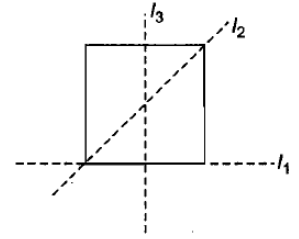If the earth were to suddenly contract to th of its present size without any change in its mass, the duration of the new day will be nearly
1. 24/n hours
2. 24 n hours
3. 24/ hours
4. 24 hours
A sqaure lamina is as shown in figure. The moment of inertia of the frame about the three axes shown in figure are respectively. Select the correct alternative.


1.
2.
3.
4.
A particle performs uniform circular motion with an angular momentum L. If the frequency of the particle motion is double, the angular momentum becomes
1. 2L
2. 4L
3.
4.
In figure (a), a meter stick, half of which is wood and the other half steel is pivoted at the wooden end at O and a force F is applied to the steel end a. In figure (b) the stick is pivoted at the steel eid at O' and the same force F is applied at the wooden end at a' The angular acceleration

1. in (a) is greater than in (b)
2. in (b) is greater than in (a)
3. equal both in (a) and (b)
4. none of the above.
A 20 kg solid disc rolls on a horizontal surface at the rate of 4 . Its total kinetic energy is
1. 60 J
2. 120 J
3. 240 J
4. 80 J

1. \(\dfrac{7ma^2}{16}\)
2. \(\dfrac{3ma^2}{16}\)
3. \(\dfrac{3ma^2}{4}\)
4. \(\dfrac{9ma^2}{16}\)
The centre of the mass of \(3\) particles, \(10~\text{kg},\) \(20~\text{kg},\) and \(30~\text{kg},\) is at \((0,0,0).\) Where should a particle with a mass of \(40~\text{kg}\) be placed so that its combined centre of mass is \((3,3,3)?\)
1. \((0,0,0)\)
2. \((7.5, 7.5, 7.5)\)
3. \((1,2,3)\)
4. \((4,4,4)\)
The position of a particle is given by \(\vec r = \hat i+2\hat j-\hat k\) and momentum \(\vec P = (3 \hat i + 4\hat j - 2\hat k)\). The angular momentum is perpendicular to:
| 1. | X-axis |
| 2. | Y-axis |
| 3. | Z-axis |
| 4. | Line at equal angles to all the three axes |
A body falling vertically downward under gravity breaks into two parts of unequal masses. The center of mass of the parts taken together shifts horizontally towards
1. heavier piece
2. lighter piece
3. does not shift horizontally
4. depends on the vertical velocity at the time of breaking
A particle of mass m moves along line PC with velocity v as shown. What is the angular momentum of the particle about O

1. \(\text {mvL}\)
2. \(mvl\)
3. \(mvr\)
4. \(0\)






